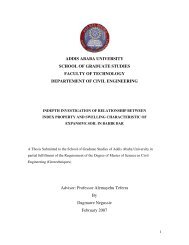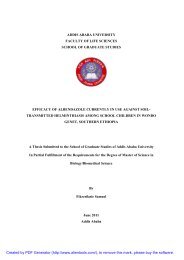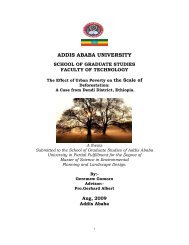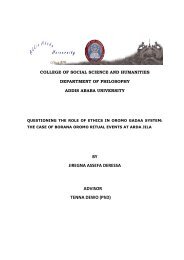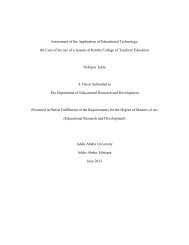FACTORS THAT CONTRIBUTE TO THE PROBLEMS EFL ...
FACTORS THAT CONTRIBUTE TO THE PROBLEMS EFL ...
FACTORS THAT CONTRIBUTE TO THE PROBLEMS EFL ...
Create successful ePaper yourself
Turn your PDF publications into a flip-book with our unique Google optimized e-Paper software.
It is obvious that students will find it easier to listen to a passage on familiar<br />
topic than on unfamiliar one. Moreover, in order to make students familiar to a<br />
topic, scholars advise to activate the learners’ schemata. Activating the students’<br />
background knowledge prepare the students to use what they know about a topic,<br />
and to facilitate effective comprehension. Many teachers gain such awareness<br />
from their college education. It is difficult to be sure, however, how many teachers<br />
are handling these methods appropriately. Further study needs to be conducted in<br />
this regard.<br />
b) Cultural awareness<br />
Lack of sociocultural and contextual knowledge of the target language can<br />
present an obstacle to comprehension as language is culture specific. For Wolvin<br />
and Coakley (1988), culture can be explained as what the society thinks and does,<br />
and the language is the expression of the ideas of the society; language carries<br />
knowledge and cultural information and it reflects the substantial and particular<br />
ways of thinking of people. It seems for this reason that Brown (1994) says the<br />
marriage between language and culture is inseparable. Culture plays a significant<br />
role not only in comprehension but also in learning a foreign language as a whole.<br />
Regarding this Brown states the following points.<br />
“...culture, as ingrained set of behaviors and modes of perception, becomes<br />
highly important in the learning of a second language. A language is a part of<br />
culture and a culture is a part of language; the two are intricately interwoven<br />
so that one can not separate the two without losing the significance of either<br />
language or culture.” (1994:165)<br />
From this one can infer that the student with no background knowledge of culture<br />
in English, American or other English speaking countries, is unlikely to understand<br />
Anglophone modes of thinking as expressed in the English language.<br />
In addition, on studies conducted on the effects of pre-established<br />
background knowledge on reading comprehension, Brown et al (1977) cited in<br />
Long (1989) found out that subjects performed significantly better when they are<br />
provided with reading passages that reflected their own cultural background. This<br />
further demonstrates that background knowledge of culture is a significant factor<br />
that affects comprehension.<br />
22






